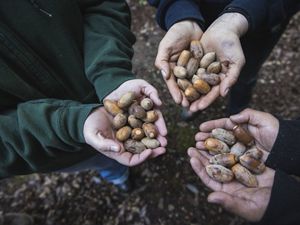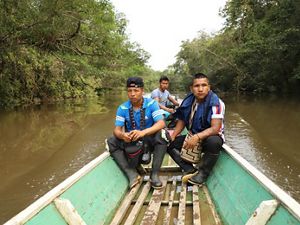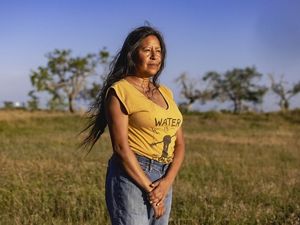School Is in Session: Welcome to Indian Country 101
TNC and TWG debut free tribal engagement training designed to help you work better with tribes in Washington and across the United States.
Seattle, WA
Media Contacts
-
Emily Heber
Media Relations Manager
Phone: 206-971-4376
Email: emily.heber@tnc.org -
The Whitener Group
Phone: 360-688-1004 ext. 500
Email: media@whitenergroup.biz
The Indian Country 101 courses developed by The Whitener Group (TWG), a tribally owned firm, and The Nature Conservancy (TNC) will likely feel different than other diversity, equity and inclusion training courses people have taken, and that is part of the point.
The main objective of the Indian Country training series is stated simply to “help you offend Native people 50% less and engage with tribes 25% more effectively.” Perhaps this feels like a low standard, but as TNC’s North America Director, Jan Glendening, states:
"We know one of the largest barriers to non-tribal organizations partnering with tribes is the amount of preemptive education tribal leaders and representatives must provide non-native leaders about tribal sovereignty, fundamentals of being a tribal nation, basic terminology and customs in order to move forward with complex negotiations. Indian Country 101 is one way organizations like The Nature Conservancy can step up to begin to ease that burden.”
What began as a six-month project turned into a multi-year endeavor—sifting and curating content to be robust, comprehensive and, in acknowledgement of the diversity of Indian Country itself, a daunting assignment and a likely reason why a training like this doesn’t exist already. The courses weave together authentic commentaries while always keeping Native voices at the forefront. Narrated by Jennifer Whitener Ulrich, a first-generation descendant of the Squaxin Island Tribe (who grew up at her Tribe and has worked in Indian Country her entire career), the courses are peppered with her snarky commentary, thoughts and experiences on the complex world of tribal governments and issues like Native identity. She is relatable, doesn’t pull (too many) punches and reveals her own insecurities when working in Native spaces.
Jennifer is joined by her father, whom she has labeled the “Indian Country Jack-of-All-Trades,” Bob Whitener, along with her “Indian Law Professor Uncle,” Ron Whitener, both of whom are enrolled members of the Squaxin Island Tribe and have had lifelong careers in Indian Country. As an MBA, MPA and JD, respectively, the trio each bring a deep well of personal experience, relationship experience and professional experience.
Jennifer is the first to comment: “The most engaging part of the training is actually the multitude of Native scholars, musicians, authors, beaders, fry bread truck operators, comedians and more, woven throughout the entire curriculum!”
“TNC is appreciative of the energy, heart, snark-swathed-insight and dedication that Jennifer Whitener Ulrich and The Whitener Group have offered,” says Puget Sound Conservation Director Jessie Israel. “I believe the Indian Country training courses can truly help conservation organizations like ours, along with government agencies and private companies, to do better, more effective work with tribes.”
One of the training’s unique aspects is its eLearning platform. Rather than present the course through a live or recorded webinar format with a talking head or two, the course can be taken at your own pace that allows participants to engage effectively with the material. Filled with "People and Organizations to Know," "Quick Reference" definitions, "Engagement Tips" and "Things Not to Say," and steeped in a multitude of external resources, Indian Country 101 is a reference guide and training rolled into one—and it is always at your fingertips to revisit.
And while the training landing page states explicitly that you will not walk away with a certification, it does guarantee that, if you pay attention, you will have a much better chance at not sticking your foot in your mouth.
The tuition-free course is available now. This training is being delivered on TNC’s Conservation Training platform—an open and free learning community that offers conservation-based training materials from The Nature Conservancy and our partner organizations, with more than 400 hours of free online courses, many in multiple languages. Visit TNC’s Indian Country 101 Training webpage to find out more about this training or hear what people are already saying about it.
Start Your Training Today
This training is being delivered on TNC’s ConservationTraining.org platform—an open and free learning community that offers conservation-based training materials from The Nature Conservancy and our partner organizations. We offer more than 400 hours of free online courses, many in multiple languages. Visit Indian Country 101 at ConservationTraining.org to start your training today.
The Nature Conservancy is a global conservation organization dedicated to conserving the lands and waters on which all life depends. Guided by science, we create innovative, on-the-ground solutions to our world’s toughest challenges so that nature and people can thrive together. We are tackling climate change, conserving lands, waters and oceans at an unprecedented scale, providing food and water sustainably and helping make cities more sustainable. Working in more than 70 countries and territories, we use a collaborative approach that engages local communities, governments, the private sector, and other partners. To learn more, visit nature.org or follow @nature_press on Twitter.



